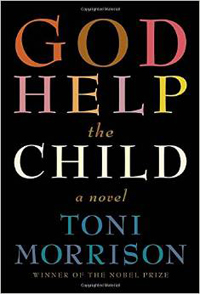 Toni Morrison, God Help the Child: A Novel (New York: Knopf, 2015), 178pp.
Toni Morrison, God Help the Child: A Novel (New York: Knopf, 2015), 178pp.
The writer and Princeton professor emerita Toni Morrison (b. 1931) has won almost every major award one could imagine—the National Book Critics Circle Award, the Pulitzer Prize, the Nobel Prize in Literature, and in 2012 the Presidential Medal of Freedom. This is her eleventh novel, and the first one that's set in our own day.
At the center of this story is a young woman named Bride who was wholly rejected by her mother Sweetness because she was so jet black at birth. Indeed, "she was so black she scared me," says Sweetness, whose skin color is "high yellow." A horrible lie is only one of the ways that Bride acts out in longing for her mother's love.
But this is a story not about race but about childhood traumas and how those tragedies can define our adult lives if we let them. People tend to "cling to a sad little story of hurt and sorrow — some long ago trouble and pain life dumped on their pure and innocent selves."
In addition to Bride and Sweetness, there are three other main characters, and in alternating chapters Morrison gives each one of them the narrator's voice. There's Bride's boyfriend Booker who dumped her without explanation, her best friend Brooklyn, and a wrongly convicted child molester named Sophia. All five characters experienced some version of child abuse in their family past, as did a minor character named Rain.
At least the mother Sweetness reached some degree of wisdom born of regret and resignation: "I wasn't a bad mother, you have to know that, but I may have done some hurtful things to my only child [Bride] because I had to protect her. Taught me a lesson I should have known all along. What you do to children matters. And they might never forget."
Sweetness did the best she could. And if the pregnant Bride thinks that being a parent of a baby is "all cooing, booties, and diapers, she's in for a big shock. Big. Listen to me. You are about to find out what it takes, how the world is, how it works and how it changes when you are a parent. Good luck and God help the child."
So, the Scripture quotation at the beginning of the novel turns out to be essential rather than superfluous: "Suffer little children to come unto me, and forbid them not." (Luke 18:16).


